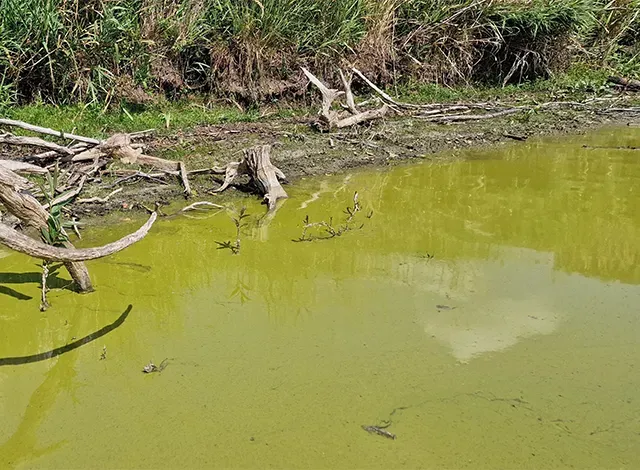SUBMITTED
Potentially harmful algal blooms including blue-green algae are a natural seasonal phenomenon that may appear in our lakes, rivers and ponds. Many of these blooms are relatively harmless; however, some species have the potential to produce toxins which may be harmful to people and animals. The presence of a harmful algal bloom and its toxins can only be confirmed through a laboratory test, so it is recommended to take a cautious approach when you suspect a potentially harmful algal bloom. Toxins are released when algal cells break down. These toxins when released can cause skin irritation, nausea and vomiting, and in higher concentrations, liver problems.
Algae blooms do degrade with time; however, it is not possible to say whether the toxins have completely left the area. Once the toxin is released from the cell, where it goes depends on the local characteristics of water movement in the area. The toxin will eventually be diluted into the body of water as any other soluble compound.
Drinking Water
The Health Unit advises people using surface water for recreation and drinking, to become familiar with potentially harmful algae so they can make informed decisions on when to avoid contact with the water. Surface water is never a safe source of drinking water without effective treatment. The toxins released by harmful algae are not removed by commonly used treatment methods such as boiling, chlorination or ultraviolet light treatment. Surface water requires specialized treatment. Consult a water treatment specialist if your drinking water comes from a surface body of water such as a lake or river. You may want to choose another source of water for drinking.
Recreational Water Use
Avoid activities that increase your exposure to toxins in the water during an active algae bloom. When deciding whether to resume recreational use of the water after a harmful algae bloom (swimming and water sports) consider the following factors:
- Faster moving water will dilute and move the toxins out of an area more quickly, further decreasing the risk to health. Each property will have a different water flow pattern, so a local assessment is useful to further assess risk.
- Skin irritation is the first sign that the level of toxin is significant in the water, so if this occurs, it is important not to go in the water. A few more days will help to clear the water if it is moving well, unless another bloom has occurred.
- Bacteria, viruses and other microbes that can affect health are commonly found in surface water such as lakes and rivers, so it is important not to swallow the water. Young children are more likely to swallow water so they should be watched carefully when playing or swimming in the water.
- Be cautious about eating fish caught in water where a harmful algae bloom has occurred. Toxins are concentrated in the liver. So avoid consuming the liver, kidneys and other organs of fish caught in an area affected by potentially harmful algae.
Algae exist in nature; however, nutrient levels can contribute to an increase in blooms of algae. You can help reduce nutrient levels entering water bodies by reducing the use of household fertilizers, agricultural runoff, and ensuring your septic system is in good working order.
Residents are encouraged to contact the Spills Action Center at 1-800-268-6060 to report any new potentially harmful algae blooms. If possible take pictures of an active bloom as this may help identify the type of algae.
For more information about harmful algal blooms including blue-green algae, visit the Health Unit’s Recreational Water page or call 1-800-660-5853. You can also connect with @LGLHealthUnit on Facebook and X or on Instagram @lglhealthunit.z for important public health updates.






